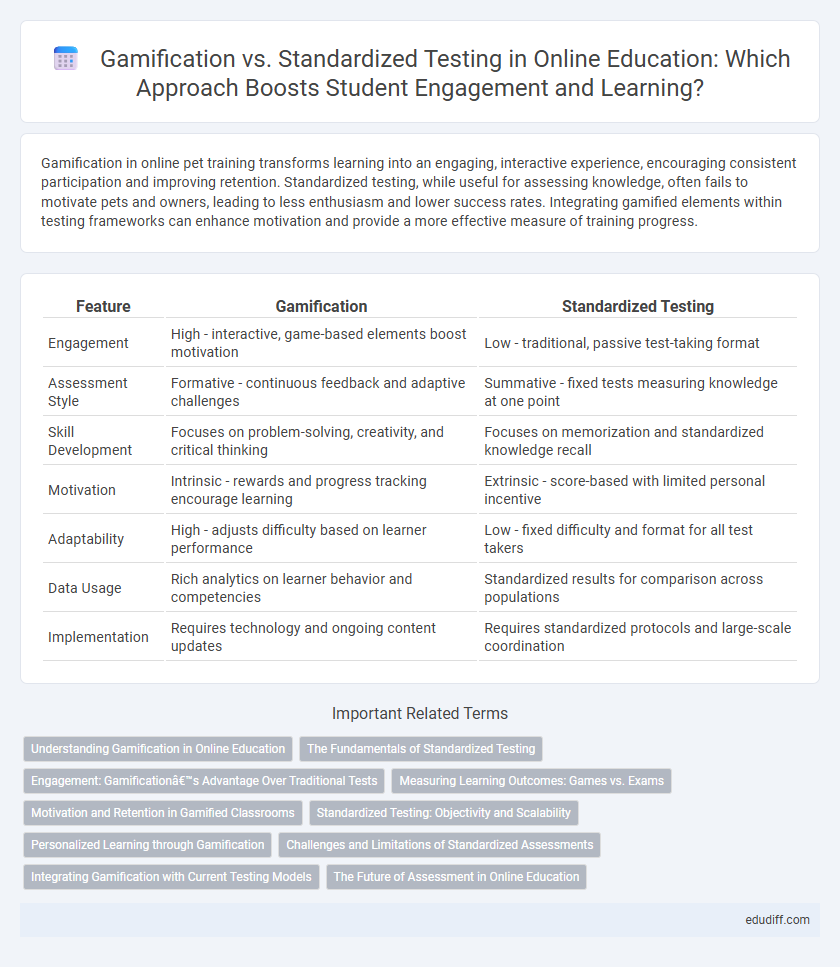Gamification in online pet training transforms learning into an engaging, interactive experience, encouraging consistent participation and improving retention. Standardized testing, while useful for assessing knowledge, often fails to motivate pets and owners, leading to less enthusiasm and lower success rates. Integrating gamified elements within testing frameworks can enhance motivation and provide a more effective measure of training progress.
Table of Comparison
| Feature | Gamification | Standardized Testing |
|---|---|---|
| Engagement | High - interactive, game-based elements boost motivation | Low - traditional, passive test-taking format |
| Assessment Style | Formative - continuous feedback and adaptive challenges | Summative - fixed tests measuring knowledge at one point |
| Skill Development | Focuses on problem-solving, creativity, and critical thinking | Focuses on memorization and standardized knowledge recall |
| Motivation | Intrinsic - rewards and progress tracking encourage learning | Extrinsic - score-based with limited personal incentive |
| Adaptability | High - adjusts difficulty based on learner performance | Low - fixed difficulty and format for all test takers |
| Data Usage | Rich analytics on learner behavior and competencies | Standardized results for comparison across populations |
| Implementation | Requires technology and ongoing content updates | Requires standardized protocols and large-scale coordination |
Understanding Gamification in Online Education
Gamification in online education uses game design elements like points, badges, and leaderboards to enhance student engagement and motivation. Unlike standardized testing, which measures learning through uniform assessments, gamification promotes interactive and personalized learning experiences that adapt to individual progress. This method leverages real-time feedback and rewards to improve knowledge retention and foster a more dynamic educational environment.
The Fundamentals of Standardized Testing
Standardized testing fundamentally relies on uniform procedures, consistent scoring, and objective measurement to evaluate student performance across diverse populations. These tests emphasize reliability and validity to ensure fair comparisons and data-driven decision-making in educational settings. Core elements include multiple-choice questions, predetermined answer keys, and statistical analysis to assess knowledge and skills uniformly.
Engagement: Gamification’s Advantage Over Traditional Tests
Gamification significantly boosts student engagement by transforming assessments into interactive and immersive experiences, leveraging game mechanics such as rewards, challenges, and immediate feedback. Unlike standardized testing, which often induces stress and disengagement, gamified assessments foster motivation and sustained attention through dynamic, personalized content. This engagement advantage leads to improved learning outcomes and higher retention rates in online educational environments.
Measuring Learning Outcomes: Games vs. Exams
Gamification leverages interactive, real-time feedback and adaptive challenges to assess learning outcomes dynamically, engaging learners through practical application and problem-solving scenarios. Standardized testing relies on fixed-format questions and scoring systems, providing a uniform but static measurement of knowledge under timed conditions. Research indicates gamified assessments can enhance retention and motivation, while exams prioritize objective benchmarking and comparability across diverse populations.
Motivation and Retention in Gamified Classrooms
Gamified classrooms increase student motivation by incorporating game elements such as points, badges, and leaderboards, which create an engaging and interactive learning environment. These motivational factors boost retention rates by encouraging continuous participation and effort, unlike standardized testing that often generates stress and limits sustained interest. Studies show that gamification enhances knowledge retention through active learning and immediate feedback mechanisms, leading to improved academic outcomes.
Standardized Testing: Objectivity and Scalability
Standardized testing offers objective measurement through uniform scoring criteria, ensuring consistent evaluation across diverse student populations. Its scalability enables efficient administration to large groups, facilitating comparative analysis at regional or national levels. These features support data-driven decision making in educational policy and resource allocation.
Personalized Learning through Gamification
Personalized learning through gamification leverages adaptive algorithms to tailor educational content to individual student needs, enhancing engagement and retention compared to standardized testing methods. Gamified platforms provide real-time feedback and reward systems that motivate learners, fostering a deeper understanding and mastery of subjects. This approach contrasts with the one-size-fits-all nature of standardized tests, which often fail to address diverse learning styles and pace, limiting student potential.
Challenges and Limitations of Standardized Assessments
Standardized testing faces significant challenges such as limited ability to measure critical thinking and creativity, often reducing complex skills to multiple-choice questions. These assessments frequently fail to accommodate diverse learning styles, cultural backgrounds, and language proficiencies, resulting in biased outcomes. Moreover, the rigid structure of standardized tests can increase student anxiety and undermine motivation, limiting their effectiveness compared to gamified learning approaches.
Integrating Gamification with Current Testing Models
Integrating gamification with current standardized testing models enhances student engagement by incorporating interactive elements and real-time feedback, which traditional tests often lack. This approach leverages game mechanics such as points, badges, and leaderboards to motivate learners, improving knowledge retention and reducing test anxiety. Combining gamified assessments with standardized frameworks creates a balanced evaluation system that maintains rigor while fostering a more dynamic and personalized testing experience.
The Future of Assessment in Online Education
Gamification transforms online education by enhancing student engagement and motivation through interactive elements, contrasting with the rigid structure of standardized testing. The future of assessment in online education emphasizes adaptive, game-based evaluations that provide real-time feedback and personalized learning paths. This shift leverages data analytics to improve learning outcomes and better measure critical thinking and problem-solving skills compared to traditional standardized methods.
Gamification vs Standardized testing Infographic

 edudiff.com
edudiff.com